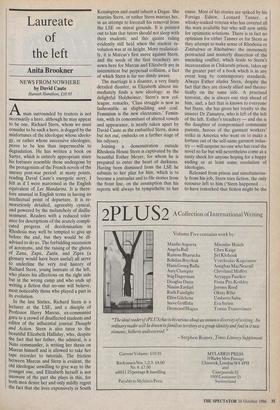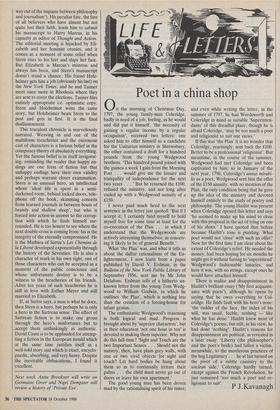Laureate of the left
Anita Brookner
NEWS FROM NOWHERE by David Caute Hamish Hamilton, £10.95 Aman surrounded by traitors is not necessarily a hero, although he may appear to be one. Richard Stern, whom we must consider to be such a hero, is dogged by the misfortunes of the ideologue whose ideolo- gy, or rather whose successive ideologies, prove to be less than impermeable to degradation. He has written a book on Sartre, which is entirely appropriate since his fortunes resemble those undergone by the protagonists of the French novels of the uneasy post-war period: at many points, reading David Caute's energetic story, I felt as if I were marooned in the English equivalent of Les Mandarins. It is there- fore unusual in English terms in having an intellectual point of departure. It is re- morselessly detailed, agreeably cynical, and powered by the melancholy of disillu- sionment. Readers with a reduced toler- ance for descriptions of the acutely compli- cated progress of decolonisation in Rhodesia may well be tempted to give up before the end, but they would be ill- advised to do so. The forbidding succession of acronyms, and the raising of the ghosts of Zanu, Zapu, Zanla, and Zipra (a glossary would have been useful) all serve to underline the very real history of Richard Stern, young laureate of the left, who places his affections on the right side but in the wrong camp and who ends up writing a fiction that no-one will believe, most noticeably those who played a part in its evolution.
In the late Sixties, Richard Stern is a lecturer at the LSE, and a disciple of Professor Harry Marcus, ex-communist guru to a crowd of disaffected students and editor of the influential journal Thought and Action. Stern is also tutor to the beautiful Elizabeth Halliday, who, despite the fact that her father, the admiral, is a Nato commander, is writing her thesis on Marcus himself and is allowed to take her tape recorder to tutorials. The friction between Marcus and Stern is evident, the old ideologue unwilling to give way to the Younger one, and Elizabeth herself is not unaware of the part she plays in this, for both men desire her and only mildly regret the fact that she lives expensively in South Kensington and could inherit a Degas. She marries Stern, or rather Stern marries her, in an attempt to forestall his removal from the LSE on moral grounds. It is pointed out to him that tutors should not sleep with their students, and this quaint ruling evidently still held when the student re- volution was at its height. More realistical- ly, it is Marcus's first move against Stern, and the seeds of the first treachery are sown here for Marcus and Elizabeth are in intermittent but perpetual collision, a fact of which Stern is far too dimly aware.
The marriage is a disaster, a very finely detailed disaster, as Elizabeth almost im- mediately finds a new ideology: as the delightful Holzheimer, Stern's new col- league, remarks, 'Class struggle is now as fashionable as shipbuilding and coal. Feminism is the new electronics.' Femin- ism, with its concomitant of altered vowels and appearance, is neatly taken apart by David Caute as the embattled Stern, down but not out, embarks on a further stage of his odyssey. Joining a demonstration outside Rhodesia House Stern is captivated by the beautiful Esther Meyer, for whom he is prepared to enter the heart of darkness. Having been dismissed from the LSE he submits to her plan for him, which is to become a journalist and to file stories from the front line, on the assumption that his reports will always be sympathetic to her cause. Most of his stories are spiked by his Foreign Editor, Leonard Tanner, a whisky-soaked veteran who has covered all the wars available but who will now settle for optimistic solutions. There is in fact no optimism for either Tanner or for Stern as they attempt to make sense of Rhodesia or Zimbabwe or Rhobabwe: the immensely protracted and masterly dissection of the unending conflict, which leads to Stern's incarceration in Chikurubi prison, takes up the greater part of a book which is in any event long by contemporary standards. Always Esther eludes Stern, despite the fact that they are closely allied and theore- tically on the same side. A practised terrorist, she is always one step ahead of him, and, a fact that is known to everyone but Stern, she has given her loyalty to the sinister Dr Zimunyu, who is left of the left of the left. Esther's treachery — and she is the daughter of compromised communist parents, heroes of the garment workers' strike in America who went on to make a fortune out of the self-same garment indus- try— will surprise no-one who has read the novel so far but will nevertheless come as a nasty shock for anyone hoping for a happy ending or at least some resolution of ideologies.
Released from prison and simultaneous- ly from his job, Stern tries fiction, the only resource left to him (`Stern happened. . . to have remarked that fiction might be the way out of the impasse between philosophy and journalism'). His peculiar fate, the fate of all believers who have almost but not quite lost their faith, leads him to submit his manuscript to Harry Marcus, in his capacity as editor of Thought and Action. The editorial meeting is hijacked by Eli- zabeth and her feminist cronies, and it comes as a moment of some relief when Stern rises to his feet and slaps her face. But Elizabeth is Marcus's mistress and always has been, and Stern's manuscript doesn't stand a chance. His friend Holz- heimer gets him a job (obviously his last) on the New York Times, and he and Tanner meet once more in Rhodesia where they are sent to cover the elections. Tanner files entirely appropriate i.e. optimistic Copy. Stern and Holzheimer write the same story, but Holzheimer beats Stern to the post and gets in first. It is the final disillusionment.
This truculent chronicle is marvellously narrated. Weaving in and out of the multiform treacheries and the enormous cast of characters is a furious belief in the conspiracy theory of absolutely everything. Yet the furious belief is in itself invigorat- ing, reminding the reader that happy en- dings are one form of fiction but that unhappy endings have their own validity and perhaps warrant closer examination. Stern is an unusual hero, an intellectual whose 'ideal life is spent in a semi- darkened room, behind locked doors, tele- phone off the hook, skimming conceits from learned journals in between bouts of brandy and shallow sleep', but who is forced into action If, as Sartre says, a man is what he does, then Stern is a hero, but perhaps he is only a hero in the Sartrean sense. The effect of Sartrean fiction is to make one groan through the hero's misfortunes but to accept them unthinkingly as authentic. David Caute is to be applauded for attemp- ting a fiction in the European mould which at the same time justifies itself as a well-told story and which is exact, encyclo- paedic, absorbing, and very funny. Despite the inevitable obfuscations, I found it excellent. Next week Anita Brookner will write on Germaine Greer and Nigel Dempster will review a history of Private Eye'.



















































 Previous page
Previous page